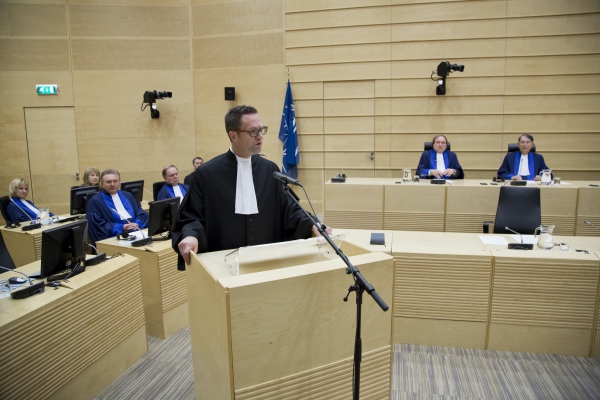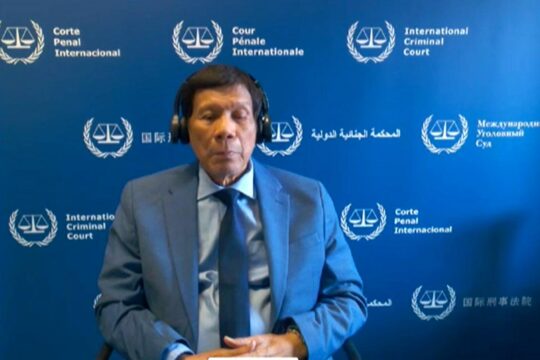The International Criminal Court (ICC) is again under fire for bad governance. In late January the International Labour Organization (ILO) handed down six judgments denouncing the “illegal” nature of steps taken by ICC Registrar Herman von Hebel as part of reforms launched in 2014. This comes as the ICC prepares to elect its next Registrar. Fourteen candidates are running, including the incumbent, Herman von Hebel.
The administrative court of the ILO, to which ICC employees had recourse, rendered six decisions on January 24, 2018, finding that the Court should pay material and moral damages after firing several employees. The judges in Geneva found that redundancy procedures put in place by the Registrar under the “ReVision” reform were “without legal foundation and, therefore, unlawful”. This is a big paradox for an organization that employs hundreds of lawyers and aims to be a model in matters of law. For the Court, the bill is not insignificant. It amounts to some 660,000 Euros, plus at least 100,000 Euros in administrative costs, which is the equivalent of six months’ ICC prosecution investigations in Mali (in 2017). The bill could rise further, since seven other cases linked to this reform are pending at the ILO. Since each case costs the ICC at least 17,000 Euros whatever the result, they weigh on the additional 120,000 Euros already budgeted. The reform was, however, urged by everyone. Since at least 2009, the ICC Assembly of States Parties has been calling for the ICC to reform its procedures and reduce bureaucracy. Several audits have been carried out, including by management consultants PricewaterhouseCoopers (PwC). Shortly afterwards in 2013, Herman von Hebel, former Registrar of the special courts for Sierra Leone and Lebanon, was elected ICC Registrar on the basis of a project that would “optimise the Registry’s operations”. At the time, ICC member States hoped that “budget savings would be made”, says the author of an audit of the ReVision project in autumn 2016. The Registrar, who works under the authority of the Court’s President, is responsible for various functions, including cooperation, witness protection, translation, support to lawyers and victims, and ICC outreach. As the judges prepare to elect a new Registrar for five years, the ILO’s decisions and the reactions they are provoking have become a real factor. Incumbent Herman von Hebel is one of 14 selected candidates. His mandate expires on April 16.
Contested methods
The ReVision reform team started work in January 2014. It was at that time composed of Court officials and external consultants. But the latter were hired without defining their role and without a proper selection procedure, according to the report of the Court’s external auditor. It further says that while they had experience in international justice, they lacked it in auditing, finance and human resources. Herman von Hebel explained that he had been pressed for time and had wanted to avoid the slowness of a call for proposals procedure. Not surprisingly, the auditor rejected this strange argument. But the harm had already been done. At the Court, rumours were rife about the motives of the Registrar, who was accused of wanting to put his people not only in the ReVision team but also in the posts that would arise from the reform. The climate of mistrust was all the greater because after the assessment the ReVision team was to tackle the heart of the project -- rationalizing the Registry. To modify its structure, the team decided to scrap 120 jobs at the Court and create the same number of new ones. The staff concerned were given the choice between being made redundant with compensation or applying for the newly created posts. The 2016 audit report carried out by the French Court of Auditors, stresses that “whilst a dozen people needed to leave the Court because of poor performance, that should have been done otherwise than through ReVision”. It adds that “the transfer of posts could have been done more simply, without redundancies and then new recruitment”. Out of 120 employees, 53 are to stay in the Registry and 67 decided to leave with the usual redundancy compensation increased by 50%, three months’ salary and payment for the legal notice period. In exchange, they agreed not to appeal. But the bill comes to more than 5.3 million Euros. In addition to the staff redundancy payments there are the fees of the ReVision team, totalling over a million Euros.
Opposition from ICC judges
On various occasions since 2014, several judges have expressed concern about the methods of the Registrar. They questioned making people redundant and then recruiting new ones, and asked the ICC President to temporarily suspend the procedure. The ILO’s decisions at the end of January have revived this opposition.
In a 30 January E-mail circulating around the Court, Italian judge Cuno Tarfusser accused President Silvia Fernandez de Gurmendi of having “systematically side-lined and tried to marginalize” the judges who have questioned the legality of the process, its methods and its cost.
Judge Tarfusser, former vice-President of the ICC (2012-2015) and unsuccessful candidate for the presidency in 2015, also asks: “Who will take the administrative and financial responsibility for what has happened?” He told the President her silence could be interpreted as “peacefully awaiting the end of your mandate and leaving a mess for the next President”. Silvia Fernandez de Gurmendi, who was elected in November 2009, leaves the presidency of the Court in March.
Asked by JusticeInfo about the ILO decisions, the ICC Registrar wrote that the Court is bound by them and has “always fully respected the decisions taken”. But Herman von Hebel also sent an E-mail to staff saying he was seeking expert advice to analyse the ILO judgments. That was enough to anger Judge Tarfusser who asked: “Don’t you think it is a waste of public money?” And he is calling for Von Hebel’s resignation.
The only part of the ReVision project on which the judges were really asked to decide – because it required amendment of internal rules – was thrown out by some of them and was abandoned. Herman von Hebel had planned to merge two services for the Defence, one administrative and the other charged with supporting ICC lawyers on fundamental issues affecting their cases. He had planned the same for services to victims’ lawyers. The plan drew numerous protests including from former ICC judge Adrian Fulford. According to remarks published in The Guardian in November 2014, the British jurist said the plan would compromise the judicial fairness of the Court.
Difficult to assess
It is difficult to draw a precise assessment of the reform, but the budget and audit reports give some indications. In 2016, the Court of Auditors said that by reorganizing the hierarchical structure within the Registry, the reform allowed the Registrar to “concentrate on the strategic management of his administration instead of being pulled between a multiplicity of day-to-day issues”. But the auditor nevertheless criticized a lack of guiding principles with regard to working methods. Above all, the auditor expressed concern that budget and finance were now divided into two sections, making vital cash flow control difficult. No additional audit on this issue has been carried out to date, as was the case for the new External Operations Division, overseeing ICC offices in countries where the Court is investigating, such as the Democratic Republic of Congo, Uganda and Mali. In a November 2017 report, the Court of Auditors concluded that the Court's main players were "unanimous and positive" about the creation of this new division. The auditor, while not completely satisfied, deemed that the new structure was more efficient. So has the reform saved the Court money? At the request of the ICC's budget and finance committtee, Von Hebel explained that: "Unfortunately, with staff accounting for about 70 per cent of costs in most areas, efficiency improvements are often only achieved by improving the use of staff time within the same staff cost budget envelope. For example, reducing the number of meetings allows people to spend more time on other mandated activities and increases productivity.”
At the end of the day, the ICC’s staff numbers continue to increase. For years the budget committee has been worried about the size of the payroll, including upcoming retirement pensions, and has been asking the Court to shed light on internal staff evaluation procedures, saying in substance that promotions are not always justified. ReVision is not about to change that.






